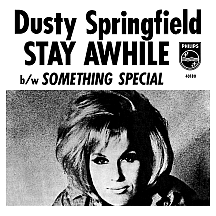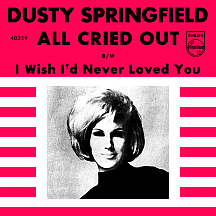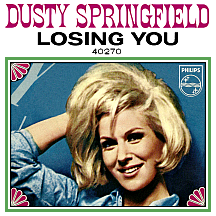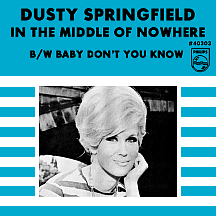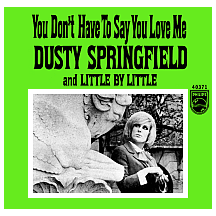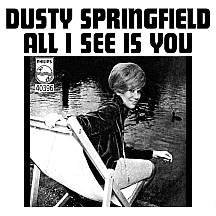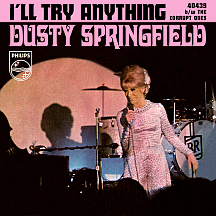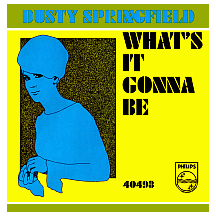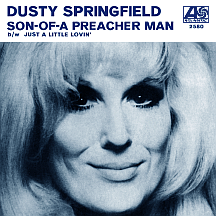DUSTY SPRINGFIELD
Once the dynamic, bouffant-bleached-blonde, "panda eye" makeup-wearing singer who called herself Dusty Springfield arrived as a solo hitmaker in her native Britain in late 1963, it was only a matter of weeks before she began commanding attention on the other side of the Atlantic Ocean. "I Only Want to Be With You" wasn't her first hit song in America, though for most of us it wasn't until after she landed alongside The Beatles in early '64 that people began putting two and two together with "That's who that was!" and "Yeah, it makes sense!" realizations that the female voice they'd heard in The Springfields' summer 1962 hit "Silver Threads and Golden Needles" was Dusty's.
Born Mary O'Brien, the young "Dusty" and her older brother, Dion O'Brien, shared a love of music while growing up in West Hampstead in the northwestern part of London. Though the two took separate paths in the late '50s, each eventually became successful...together and apart. Prior to her breakthrough, she logged time as a member of The Lana Sisters; in 1958, at age 19, she auditioned for the remaining spot in the girl group started by Iris "Riss" Long and Lynne Abrams. The trio came off as an imitation of existing pop acts along the lines of Britain's Beverly Sisters or U.S. stars The Fontane Sisters, the obvious difference being the Lanas weren't actually related. They recorded for Fontana Records between 1958 and '61, with several releases including rock and roll-leaning American tunes like "Ring-A My Phone" and "Mister Dee-Jay" and a cover of Paul Evans' American hit "Seven Little Girls (Sitting in the Back Seat)" with Al Saxon. They broke up in 1961 after nearly three years without a hit; Riss Long later formed another girl group, The Chantelles.
During the time she made her run at stardom with the Lanas, Dion and his friend Tim Field worked the coffeehouse circuit, sometimes calling themselves The Kensington Squares. When she began sitting in with them, the Springfields were born, a faux-family unit of guitar-playing folk singers. Field (whose actual name was Feild) became Tim Springfield, Dion changed his name to Tom, and Mary permanently locked in the Dusty nickname she had more or less earned during her tomboy childhood. Between 1961 and '63 the group, working with producer John Franz, enjoyed a nice run of hits including including "Silver Threads," a top 20 hit in America, and the top ten U.K. smashes "Island of Dreams" and "Say I Won't Be There."
Dusty had already begun a transition (she dyed her brunette hair blonde and was becoming more fashion-conscious) when the group visited Nashville in '63 to make some folk recordings. Being right in the heart of the American music scene for a short time was all it took for her to decide to make a change. By the end of the summer the Springfields had broken up and Dusty was in the studio cutting her first pop sides. "I Only Want to Be With You," written by Mike Hawker (who'd previously composed songs for British teen sensation Helen Shapiro) and her arranger Ivor Raymonde, was a musical about-face for Dusty, with a sound more U.S.-influenced than just about anything coming out of England at the time. It appeared on the U.K. charts in November '63 on its way to the top ten; her timing, as it turned out, was perfect. She got in on the ground floor of the British Invasion in January '64. The single hit the U.S. charts just one week behind the Beatles' "I Want to Hold Your Hand" and a few weeks ahead of the first hit from the next hot Brit import, The Dave Clark Five.
"Stay Awhile," another uptempo Hawker-Raymonde composition, made less of an impact. Songs Dusty had written herself ("Once Upon a Time" among the more memorable) made the grade as B sides of the first two singles but the pattern wasn't repeated. Often completely different songs were chosen for single release by Philips execs on either side of the Atlantic, creating a randomly varied experience for radio listeners depending on where they grew up. "Wishin' and Hopin'," a beautifully quirky Burt Bacharach-Hal David song recorded by Dionne Warwick the previous year, became Dusty's first U.S. top ten in the summer of '64, while in Britain a more conventional Burt-and-Hal ballad, "I Just Don't Know What to Do With Myself" (which U.S. soul singer Tommy Hunt had debuted some months earlier) came out instead and was a major hit there.
Other songs with origins in America received the Springfield treatment. "All Cried Out" hadn't clicked for girl singer Darlene Paul in early '64 but made a strong addition to Dusty's developing string of hits. In England, "Losing You" became her third top ten in four attempts, nicely wrapping up her rookie year; a few months later it marked her last chart entry in the U.S. for the next 14 months. With so many of the British acts of 1964 extending their chart fortunes into '65, it was a mystery...her songs were all so good (uptempo tunes "In the Middle of Nowhere" and "Little by Little," both written by Bea Verdi and Buddy Kaye, and the Gerry Goffin-Carole King ballad "Some of Your Lovin'," were all hits in Britain but were inexplicably overlooked in America). Even brother Tom was successful during this period, writing and producing hits for Australian group The Seekers.
Okay, so oversights can be forgiven; the drought ended in the spring of '66 with the greatest of all Dusty Springfield hits, "You Don't Have to Say You Love Me." A grand orchestral ballad, it had been a number one hit in Italy a year earlier for Pino Donaggio (who cowrote the song with Vito Pallavicini); English lyrics were added by Ready Steady Go! producer Vicki Wickham and Yardbirds manager Simon Napier-Bell and it placed Dusty at the top of the British charts for the first (and, if you can believe it, only) time in March of '66. Her emotion-filled performance caught on in America, no mean feat considering the previous handful of singles had gone cold. The single returned her to the top ten and brought her a Grammy nomination. She was once again on the public's radar. More hits were on the way.
"All I See is You," written by Welshman Clive Westlake and American Ben Weisman (a frequent contributor to Elvis Presley's repertoire) was a finely executed recreation of those big Italian-style productions. In 1967, Dusty recorded Bacharach and David's "The Look of Love" for the soundtrack of the James Bond spoof Casino Royale, released on Colgems, then made a different recording of it for the flip of the Philips single "Give Me Time," which became a big U.K. hit. Radio programmers in the U.S. abandoned the A side in favor of the sultry Bond track. It was nominated for an Oscar for Best Song, but Dusty wasn't slated to appear on the show, possibly due to a deep-seated stage fright she struggled with throughout her career. Sergio Mendes and Brasil '66 performed it, bossa nova style, on the April 1968 broadcast, and went on to have an even bigger hit with the song less than a year after the original.
Late '67 single "What's it Gonna Be," written by Jerry Ragovoy and Mort Shuman, featured an all-star cast of backing singers (Nick Ashford, Valerie Simpson and Carole King, in addition to newcomer Madeline Bell, for whom Dusty returned the favor a few months later on Madeline's debut, "I'm Gonna Make You Love Me"). In the summer of '68, while "I Close My Eyes and Count to Ten" was in Britain's top ten, Dusty could be found moving in new circles, having signed a deal with Atlantic Records for release of her music in the U.S. (back home, she remained with Philips). It was more than just a distribution deal, though. A stylististic transformation was in the works.
Dusty in Memphis marked the second time she made an album in Tennessee. Working with producers Jerry Wexler, Tom Dowd and Arif Mardin, the set's highlight was the soul-drippin' "Son-Of-A Preacher Man" (written by John Hurley and Ronnie Wilkins) with backing by The Sweet Inspirations, an early '69 top ten hit that nabbed her a second Grammy nomination. "Don't Forget About Me" (a three-year-old Barbara Lewis song written by Goffin and King) and standout tracks like "Breakfast in Bed" and "I Don't Want to Hear it Anymore" (a Jerry Butler gem from '64) revealed her southern mindset, but the album wasn't entirely R&B in execution. Songs like "Just a Little Lovin' (Early in the Mornin')," written by Barry Mann and Cynthia Weil, and "The Windmills of Your Mind," an Alan Bergman-Michel Legrand-Marilyn Bergman song from The Thomas Crown Affair, were softer pop productions, though not in the Italian-influenced style of earlier efforts. The latter recording (performed in the film by Noel Harrison) was an Academy Award nominee and winner, but it was Jose Feliciano who performed it on the Oscar telecast.
A post-LP production of "Willie and Laura Mae Jones" (written by singer-songwriter Tony Joe White, hitting big with "Polk Salad Annie" at the time) was a minor summer '69 hit in the same vein as "Preacher Man." Next she packed up and headed for Philadelphia to work with Gene Dozier and Roland Chambers of Gamble-Huff Productions; a sweeter brand of city soul contrasted the somewhat more ruralized Memphis recordings. "A Brand New Me" (a Kenny Gamble-Leon Huff-Jerry Butler tune recorded just months earlier by "Ice Man" Butler) wound up being her last solo top 40 hit in the States at the end of 1969; "Silly, Silly, Fool" had a brief chart run in early '70.
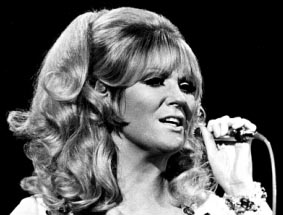
The media by this time had become increasingly curious about Dusty's sexuality. Eagle-eyed reporters noticed she had often been seen with folk singer Norma Tanega (beginning sometime after Tanega's 1966 hit "Walkin' My Cat Named Dog") and, as she was in her early thirties and hadn't married, some put two and two together. In interviews, she spoke freely of her preferences, admitting she liked whoever she liked, male or female, and didn't see relationships as straight or gay, though more often than not she showed a preference for women. In the early '70s she moved to New York, then eventually made her way to Los Angeles, where she lived for many years. Her 1973 recordings for Dunhill ("Who Gets Your Love," "Mama's Little Girl") and later efforts for United Artists, 20th Century and Casablanca were critically well received but generated little sales or airplay.
Her "big comeback" happened by chance. Synth duo Pet Shop Boys wanted Dusty to sing on one of their tracks and, after considerable effort, they were able to make it happen. "What Have I Done to Deserve This?" became a major hit in late 1987 (early '88 in the U.S., where it reached number two on the charts...higher than any of her '60s hits!). The newfound exposure turned her flagging solo career around; airplay and record sales were strong, particularly in England, for the next few years. In the mid-1990s, though, her life took a horrible turn: diagnosed with a terminal case of breast cancer, she died in March 1999 at age 59. Her music remains vibrant; to this day a wide range of artists pay tribute by performing her songs. Dusty Springfield was one of a kind, a brilliant British pop star and astonishing American soul singer rolled into one.
NOTABLE SINGLES:
- I Only Want to Be With You - 1964
- Stay Awhile - 1964
- I Just Don't Know What to Do With Myself - 1964
- Wishin' and Hopin' - 1964
- All Cried Out - 1964
- Guess Who? /
Live it Up - 1965 - Losing You - 1965
- Your Hurtin' Kind of Love - 1965
- In the Middle of Nowhere - 1965
- Some of Your Lovin' - 1965
- Little by Little /
You Don't Have to Say You Love Me - 1966 - Going Back - 1966
- All I See is You - 1966
- I'll Try Anything - 1967
- Give Me Time (L'Amore Se Ne Va) /
The Look of Love - 1967 - What's it Gonna Be - 1967
- I Close My Eyes and Count to Ten - 1968
- Son-Of-A Preacher Man /
Just a Little Lovin' (Early in the Mornin') - 1968 - Don't Forget About Me /
Breakfast in Bed - 1969 - The Windmills of Your Mind - 1969
- Willie and Laura Mae Jones - 1969
- In the Land of Make Believe - 1969
- Am I the Same Girl - 1969
- A Brand New Me - 1969
- Silly, Silly, Fool - 1970
- How Can I Be Sure - 1970
- Who Gets Your Love - 1973
- What Have I Done to Deserve This? - 1987
by Pet Shop Boys and Dusty Springfield


